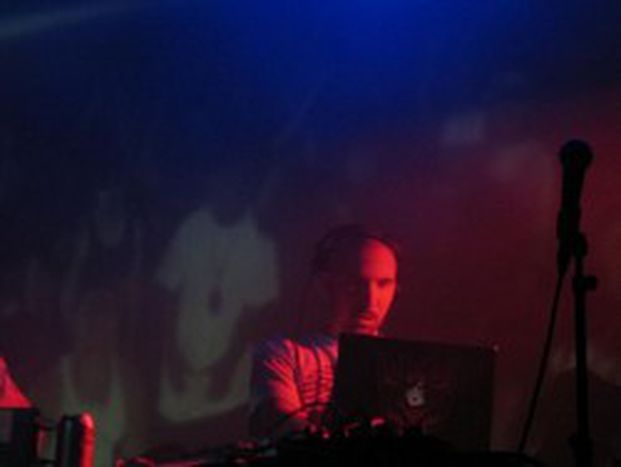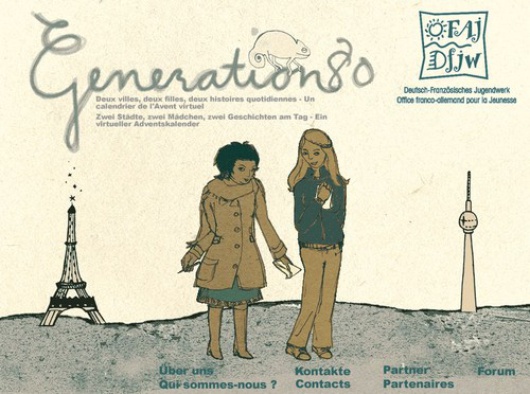
DJ Gero: vinyl wonder
Published on
Translation by:
Anna PattonOft dismissed as the childless 'loser generation’, twenty-somethings have unexpected talents. Our German and French correspondents give them a chance to have their say. Part IV of a series from Paris and Berlin
 This interview takes place by night. It’s about one a.m., and I’m standing in front of the Nouveau Casino, one of the city’s trendiest clubs. Leaving behind the crowd waiting outside the entrance, Geraud, in a baseball cap and a brighly printed T-shirt, brings me inside the dark underworld of the club. Backstage, between cups of coffee, beers, and phone calls from friends wanting to be put on the guest list, we await his performance. Tonight, Geraud becomes DJ Gero.
This interview takes place by night. It’s about one a.m., and I’m standing in front of the Nouveau Casino, one of the city’s trendiest clubs. Leaving behind the crowd waiting outside the entrance, Geraud, in a baseball cap and a brighly printed T-shirt, brings me inside the dark underworld of the club. Backstage, between cups of coffee, beers, and phone calls from friends wanting to be put on the guest list, we await his performance. Tonight, Geraud becomes DJ Gero.
Generation 80 (Blog illustration: ©Eva John/ Romy Straßenburg)
Geraud, a young musician and DJ with designer stubble, knows many of the crowd here tonight. 'That comes with the job. You just get to know loads of people.'
Turntable studies
At first, his career pathfollowed a more traditional route, with three years studying economics in Paris. Yet Geraud found he didn’t quite fit in with the world of commerce. Instead, he wanted to focus on his artistic talents and so he began studying graphic design.
Fast-forward to 2001: the 'Hypnotique DJ Show' was being broadcast on the Parisian station Nova, and Geraud sat transfixed by his radio. He began to record programmes and to buy his own records. Finally, he produced his own mix tape. 'Then there was this one evening. It was at a private party of 200 people. All of a sudden, there I was standing at the decks, and just trying everything out. That was amazing.'
From then on, things really began to happen. Geraud abandoned his studies and invested his savings in records and a mixer. To begin with, he played mostly independent hip-hop, and some electro. Inspired by the music of his youth – the eighties – for instance, bands like Indra or Technotronics, he tried to find his own style. The influences of mainstream bands like Snap, Stereo MCs and Confettis were also evident in his sound. The clubs he was playing in became bigger and bigger. His name became well-known in the scene. At a festival in Belfort, he played in front of 20, 000 electro fans.
Special techniques
Alongside gigs, he also took part in competitions, where sophisticated techniques and innovative ideas count the most. For three years in a row, Gero was selected as France’s top DJ. In a worldwide competition held in London, however, he dropped out, because the judges were unconvinced by one of his special techniques: Gero sticks small dots of glue on the turntables so that the records jump at certain points, producing a breakbeat rhythm. 'Since then I haven’t taken part in competitions, because I have already achieved everything I dreamed of. I mean, you wouldn’t do your school exams twenty times over.'
Life as a DJ, something I always imagine to be so exciting and unpredictable, is described by Geraud as 'totally normal. Once a week there’s a gig and the rest of the time I produce my records.' One has so far been released, and he is currently working on the second. Success has also brought him to far-flung places abroad. He has had gigs in New York, Berlin, London and Peking. 'The clubs there invite me. Then I’m the DJ from France.' The money he makes from gigs is enough for him to live on, 'but only because my expenses are relatively modest.' Gero doesn’t believe the profession is only for young people. Indeed, he wants to continue making music for many years to come, while also one day having a bigger apartment and a family. 'In any case, I don’t know how to do anything else,' he admits.
Creative rage
Geraud’s friend Pierre has arrived, claps his mate encouragingly on the shoulder. 'Is this for the newspaper?' After a few explanations about Generation 80, the two begin to philosophise about twenty-somethings. This is a generation who, in their eyes, is used by no-one; this is what makes it so strong. 'As the children of the babyboom generation, we were immediately told – there is no work for you, no place in this society. So we had to stand on our own two feet, and that’s what we did. We simply have a sort of rage that allows us to be creative.' The two guys proudly show me the tattoos on their ankles: 'TER' (for 'Tachos et Revolvers') is written in black squiggly writing. Their whole group of friends has had this tattoo done as a sign of their mutual support for one another. 'My greatest wish would be that we make all our dreams come true. For me right now, it’s about music.' Then the time has come: Gero steps onto the stage.
The enjoyment that he exudes while performing spreads to his audience. The dance floor explodes. He doesn’t just play records. He plays with them, lets the needle scratch them here and there and then stops suddenly. A brief glance at the screen of his laptop, and a look at the ecstatic crowd beneath him. 'When I DJ, I become 200% of myself.' Gero lets the records do the dancing.
DJ Gero mixing music during a live session
gen80.eu. A blog devised as a calendar of the virtual advent, dynamic, participative and inevitably Franco-German in order to discover each day. For one month, Eva John and Romy Strassenburg, two young journalists aged 24, exchange their flats and their towns so as to write on a daily basis their life stories, fears, doubts, dreams... that young people their own age have wanted to talk to them about. A project supported by the Franco-German Office For Young People (OFAJ)
Homepage photo: (©magaliB/ istock)
Translated from Vinyl-Wunder



